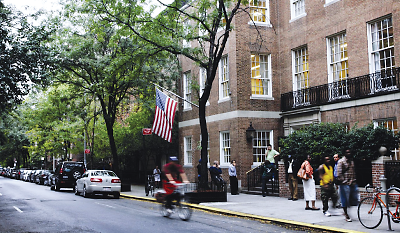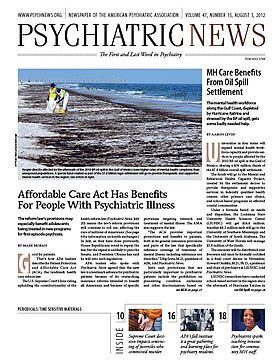Six patients discharged from New York’s Rockland State Hospital after World War II had an idea for helping mentally ill individuals that has now spread around the world—the “clubhouse.”
Fountain House, founded in 1948 on 47th Street in Manhattan by the former patients along with two volunteers, was the first such clubhouse.
They wanted to give people with mental illness a place to go after discharge, but Fountain House expanded its vision over six decades.
The clubhouse was never a place for treatment and so did not include medication clinics, day treatment, or therapy programs. It did help members prepare for employment and find housing, organizing their time around “the work-ordered day.” (Many clubhouses today also include some evening or weekend programming.)
“The clubhouse is one place where someone with mental illness is not a patient,” said Joel Corcoran, M.Ed., executive director of the International Center for Clubhouse Development (ICCD), an organization that grew out of Fountain House and now serves as a standard-setting, training, and certifying body for the movement.
Not every psychiatrist may need to understand the clubhouse model, said Jeffrey Geller, M.D., a professor of psychiatry at the University of Massachusetts and a liaison between the ICCD and the American Association of Community Psychiatrists.
“But for those who treat patients with serious mental illnesses and who live in areas with clubhouses, the latter can serve as an additional resource for the right patients,” said Geller in an interview. He is also APA’s Area 1 trustee.
In some ways, clubhouses hark back to the mid-19th century and the days of the early asylums and moral treatment of people with mental illness, he said. Vocational training and experience then were unpaid but helped prepare patients for return to their communities, so work was viewed as fundamental.
This paradigm was disrupted in the 20th century by deinstitutionalization and the rise of a patient-rights movement that saw unpaid labor within the state hospitals as exploitation, said Geller.
“However, if people with serious mental illnesses are to have a role in the community, they must participate in the fabric of the community and that means working,” he said.
So Fountain House and its offspring came along just when they were needed to make productive work again a part of the recovery process for people with mental illness.
Today Fountain House has 1,300 members with about 300 visiting each day, said Kenneth Dudek, M.S.W., its executive director.
Another 200 members work in supported employment, and 500 are in supported housing sponsored by the clubhouse. There are eight other clubhouses in New York City as well.
During the day, members work around the clubhouse, doing tasks such as answering the phone, keeping the place clean, or cooking lunch.
“We intentionally do not have enough staff,” said Dudek. Everything that’s done around the building is thus a partnership between peers and the professional staff.
“Membership is voluntary,” said Dudek. “If they are coerced, it doesn’t work.”
In addition, about 120 Fountain House members are enrolled in some form of postsecondary education.
“This spring, 10 of our members graduated from two- or four-year colleges in New York, as well as one with a master’s degree and one Ph.D.,” he said. “A lot of people get ill when they’re in college. So we support them through the admissions process and their first few classes. If they have difficulties, we can—with their permission—intervene to help them out.”
ICCD includes 341 clubhouses around the world, with 197 in the United States scattered across 37 states. The numbers vary as individual sites gain or lose funding or members.
The clubhouses have an average of 150 members each, with 60 to 70 members coming in each day, said Corcoran.
Through the first few decades of its existence, Fountain House served as the de facto headquarters for the nascent clubhouse movement. Its members and staff served as consultants, trained counterparts from other sites, and helped develop international standards.
Fountain House was awarded a multiyear grant in 1977 from the National Institute of Mental Health to establish a national training program for the clubhouse model. Ultimately, as the number of clubhouses grew, ICCD was born as a separate organization in 1994.
ICCD helps new clubhouses through several initial stages. First, a round of new clubhouse development training gets them oriented. Next, organizers spend two weeks at one of 10 training bases at clubhouses around the world. Besides Fountain House, the other U.S. sites are in St. Louis, Salt Lake City, Worcester, Mass., and Greenville, S.C.
“We give them a ‘coach’ for a year who helps them put together a case statement for funding and offers suggestions on dayto-day operating practices,” said Corcoran.
New clubhouses get a two-year free membership in ICCD, then pay dues on a sliding scale of 0.25 percent to 1 percent of annual budgets. They can then apply for accreditation, a process that includes consultation for improvements.
“We’re an interactive community,” said Corcoran. “Clubhouses learn from and support each other.”
Clubhouse funding varies widely. Some operate only on donated funds, while others seek government support.
“About one-third of the clubs in the U.S. get some or all of their funding from Medicaid,” said Corcoran. “But the goal should be a diversity of funding sources. If you depend on just one source, you’re too vulnerable to changes in grant-making trends.”
Recently, the clubhouse movement has sought to ground its approach with more data.
“The clubhouse model has been around for 60 years, but there’s been very little research to support programs,” said Colleen McKay, M.A., an associate professor in the Department of Psychiatry at the University of Massachusetts and director of the Program for Clubhouse Research in Worcester.
Her office is now conducting a comprehensive, updatable survey of the 341 currently accredited clubhouses in 30 countries looking at their demographics, services, staffing, budgets, and numbers of members in employment programs.
That’s not as simple as it sounds, said McKay in an interview. The variability in individual clubhouse programs complicates research.
“You have to study the clubhouse model as it is rather than making it fit the research model,” she said.


